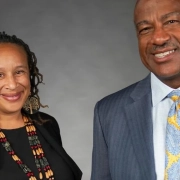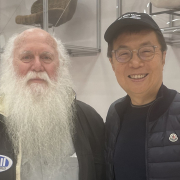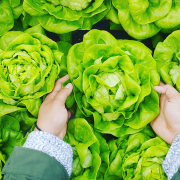Grand Challenges and School of Veterinary Medicine Host Emergency Consultation to Combat H5N1 Influenza
On Thursday May 16, 2024, Grand Challenges and the School of Veterinary Medicine at UC Davis teamed up to host an Emergency One Health Consultation on Combating H5N1 Influenza, the virus currently decimating marine wildlife populations and circulating in milk in the US. The online event attracted more than 600 registrants and featured a cross-sector, international lineup of panelists who are experts on infectious diseases, influenza, veterinary medicine, food safety, disease diagnostics, and public health.
The Consultation was held in response to the growing number of cases of H5N1 Influenza that have appeared in wildlife, poultry, dairy cattle, and now humans, according to Mark Stetter, Dean of the UC Davis School of Veterinary Medicine. Repeated mammal-to-mammal transmissions have been observed in recent months, including transmission between cows and from cows to cats and humans.
The high rate of mammal-to-mammal transmissions is increasing the concern that a large-scale spillover of the virus into humans could occur, or that it could significantly disrupt our food production systems in the US and abroad. The Consultation assembled expertise around the virus and pandemic responses, in general, as part of a broader effort to create robust and effective pandemic preparedness, prevention, and response infrastructure in the US.
Throughout the program, the panelists, who included scientists from leading US government agencies, state and county health officials, and university experts, voiced overwhelming support for a One Health approach to build long-term, comprehensive public health systems and strategies for early preparedness, prevention, and responses to emerging health threats. The One Health approach considers the interdependencies of animals, plants, and humans and the influence of one group’s health and well-being on the others.
Marcela Uhart, an Argentinian veterinarian and director of the Latin American Program at the Karen C. Drayer Wildlife Health Center at UC Davis, opened the event with a somber depiction of H5N1 Influenza’s impact on wildlife in South America: hundreds of thousands of deaths occurring across numerous species, from marine mammals to birds.

Marcela Uhart’s team observed mass mortality of elephant seal pups during the H5N1 Influenza outbreak on the Argentinian coast in October 2023. PC: Ralph E.T. Vanstreels
In one colony of elephant seals, nearly 95% of the seal pups – some 17,000 individuals – died during the H5N1 outbreak. For threatened or endangered species, H5N1 Influenza is adding another layer to their extinction vulnerability. The Peruvian Pelican, for instance, is endangered and lost 36% of its population during the outbreak, according to Uhart.
Health threats, including H5N1 Influenza, can spillover from wild populations into domestic animals, or vice versa. Monitoring programs that track the health of wild animals could detect outbreaks at an early stage. Early detection can grant health care providers and other sectors, such as the dairy and poultry industries, valuable time to prepare and respond to the threat, according to Jonathan Sleeman, Science Advisor for Wildlife Health to the US Geological Survey. Similarly, early detection can allow for targeted containment efforts to protect wild populations and conserve biodiversity.
Early detection systems go hand-in-hand with fundamental research on the virus and its mechanisms of transmission within and across species. The H5N1 virus that is currently affecting cattle does not seem well-adapted to humans, which is why there has not been sustained human-to-human transmission, according to Angel Desai, an adult infectious disease specialist at UC Davis Medical Center.
Questions remain about the potential for the virus to evolve and become more transmissible human-to-human. “It is so important to have research so that we can address these questions about diseases that come out of nowhere,” said Gigi Gronvall, Senior Scholar at the Johns Hopkins Center for Health Security and Associate Professor in the Department of Environmental Health and Engineering at the Johns Hopkins Bloomberg School of Public Health. “There’s only one way to get that needed information and that is to do the research.” Understanding how the virus changes warrants surveillance of H5N1 occurrence in domestic and wild animals, monitoring of changes to the genomic sequence of the virus, and basic research into its transmission ability.
Lack of funding is a major barrier to early detection systems and basic research as part of a One Health approach. “There’s an outbreak, we get this pulse of funding, and then it just drops to nothing in between events,” said Deana Clifford, a senior wildlife veterinarian at the California Department of Fish and Wildlife. Policymakers in the US recognize the importance of One Health, but the funding mechanisms to implement the approach, including surveillance, are insufficient, according to Christine Johnson, Professor of Epidemiology and Ecosystem Health at UC Davis.
In addition to funding, coordination between agencies, academia, and the private sector is critical to prepare for and respond to health threats. Despite the COVID-19 pandemic, we still do not have a good early detection and emergency response system in place for emerging health threats, according to Jonna Mazet, Vice Provost for Grand Challenges at UC Davis. “We have advanced the science, and every organization has advanced their own sector’s plans, but even after COVID, we are not interdigitating those plans for a unified response.”
Other panelists described their experiences with early detection and prevention programs for health threats, identifying gaps and best practices of current systems. “Every outbreak is different. Our immune response is different,” warned Rick Bright, Chief Executive of Bright Global Health and Director of the Biomedical Advanced Research and Development Authority in the US Department of Health.
Developing vaccines for humans is a lengthy process, both to develop the vaccine and produce it at a large enough scale to be effective in a global population. “Generally, we are waiting until we see human-human transmission,” said Bright. “If we had a way to collaborate and move back to see more of these triggers and signals in the interface between animals and humans and in the environment before we see widespread outbreaks in humans, it could allow us to move [up vaccine production] timelines.”
One tool available for early detection systems is surveillance of viruses in wastewater. The methodologies for this approach were developed in academic laboratories and have been adopted by many city, county, and state health departments, according to Heather Bischel, Associate Professor of Civil and Environmental Engineering at UC Davis. Detection of viruses, such as Influenza A, in wastewater can allow for localized, nimble preparedness and more rapid and effective responses.
Integrating these tools into a successful and effective preparedness, prevention, and response plan requires coordination across all levels of government and across sectors. Multi-agency and cross-sector coordination around disease surveillance already occurs in some areas, highlighting the efficacy of the One Health approach.
“For the current H5N1 response, the Centers for Disease Control and Prevention is using a One Health Approach to understand and address risks to people who work on dairy and poultry farms, or who might interact with infected livestock, companion animals, or wildlife,” said Christine M. Szablewski, Acting Chief Veterinary Officer for the Influenza Division at the Centers for Disease Control and Prevention.
Similarly, the US Department of Agriculture (USDA) is using a One Health approach with a focus on H5N1 in the US dairy industry. Since March 2024 (and as of May 16), there have already been 49 detections of H5N1 Influenza on dairy farms across nine states, according to Sarah Tomlinson, Senior Leader for Science and Information Technology for Veterinary Services within the Animal and Plant Health Inspection Services of the USDA. “We are all working actively as quickly as we can to learn as much as we can about this disease in dairy cattle. We’re using a multi-factorial One Health approach and listening to the science to try to inform all of our next decisions.”
In Canada, where H5N1 was first detected in 2021, the coordination between animal health, public health, and environmental departments in government, as well as with non-governmental agencies, academia, and frontline veterinarians is key to gather H5N1 detection information among wildlife and livestock, according to Julie Paré, Senior Veterinarian Science Specialist for the Canadian Food Inspection Agency. Aggregated data are disseminated via online dashboards to increase transparency and awareness around current levels of H5N1 Influenza in wildlife and domestic animals, which can inform policymakers and regulatory agencies.
Kimberly Dodd, Director of the Michigan State University Veterinary Diagnostic Laboratory, highlighted how the role of disease surveillance programs and coordination with regulatory agencies can change over the course of an outbreak. “To ensure early detection of a new disease outbreak, veterinary diagnostic labs continually perform surveillance of suspect flocks, while simultaneously testing wild birds to characterize the circulating influenza strains. When a highly pathogenic H5N1 Influenza virus is detected, we switch to an active surveillance approach that includes testing healthy animals. This information guides regulatory decision-making in efforts to reduce spread,” she said. “As the outbreak wanes, we shift into the third phase of our role: to perform the required testing to demonstrate a lack of new infections, indicating that we’re once again free from disease.”
However, the panelists highlighted that these plans will all come down to impacting individuals, especially farmers whose livelihoods can be affected by H5N1 Influenza outbreaks among their livestock and poultry.
Implementing preparedness and response plans on farms requires careful and intentional communication, according to Richard Pereira, Associate Professor of Clinical Livestock and Herd Health at UC Davis. “There’s still a need for communication that’s tailored to farmers and farm workers. It has to be summarized. It has to be practical. It has to acknowledge the language, cultural, and social challenges of the target audience.”
As monitoring systems and diagnostic labs detect pathogens and other health threats, prevention and response plans will affect the livelihoods of our farmers. “What are the economic consequences to our stakeholders? We need to have livestock and poultry farmers in our equations, know that they are socially affected, and complement our science with economic considerations,” said François Elvinger, Professor of Veterinary Epidemiology at Cornell University.
Communication and coordination with stakeholders, from individual farmers through high levels of government and across academia and industry remains a key challenge for equitable and effective plans and systems sound health threats. “The networks, the connections. It’s so important,” said Julie Breher, from the County of San Diego Public Health Laboratory. “We need to think creatively about how we can get everyone at the table, break down silos, and bridge across interfaces.”
As the program concluded, Bright voiced a call to action. “This [H5N1 Influenza outbreak] has been a wakeup call. H5N1 has now permeated domestic mammals across our country. It’s in our food supply, it’s in other animals. It can go into a dormancy mode this fall and come back with a vengeance in the spring. We can’t stop our preparation. We have to prepare because we know the virus is here, and we know what it is capable of.”
A policy brief based on and enumerating the panelists’ recommendations and audience feedback is imminently forthcoming. In the meantime, see the Pandemic Roadmap recommendations here: https://www.ucdpandemicpreparedness.org/.
For more information on H5N1 Influenza, please visit the UC Davis Grand Challenges “Combatting H5N1 Influenza” webpage.

















